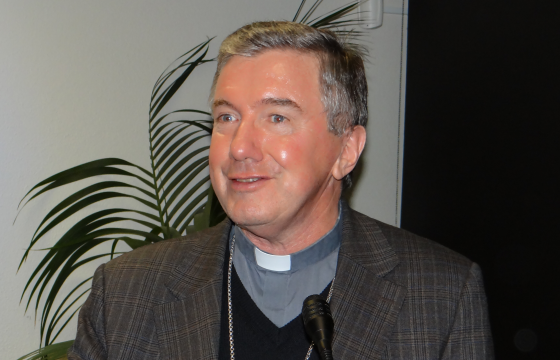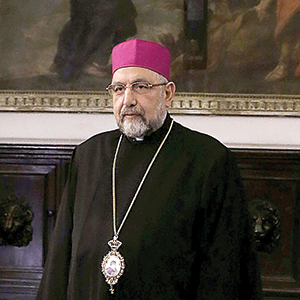Aleppo a ‘living hell’
Bishop George Abou Khazen, the apostolic vicar of Aleppo, has condemned the shelling of the Christian quarter of western Aleppo by rebels in the east, which resulted in the deaths of four schoolchildren on 13 October. “Aleppo is now a living hell,” Bishop Khazen said. It is a “hell that touches everyone, east and west, full of death and destruction, refugees and lack of electricity and water, families who touch pain with their hands on a daily basis”. He joined the call of Pope Francis on 12 October for “an immediate ceasefire”. The latest official figures shows that more than 100 children have been killed in the rebel-held areas of the east of the city in just over a week.
Syria’s old economic capital is split between a government-controlled western section with more than a million people, and a rebel-held east with 250,000 residents. The Government and its Russian ally have launched a huge offensive against the east.
“We know that the Pope’s heart is with us,” said the Archbishop of Aleppo’s Armenian Catholics, Boutros Marayati (above). “We also saw it when he chose to include Archbishop Mario Zenari, Apostolic Nuncio in Damascus, in the list of future cardinals.” Recalling his own experience of the regular “nightmare of bombs”, the Archbishop said: “We are again without water and without light and the situation is becoming increasingly serious, especially for children.”
The King of Bahrain has given permission for the building of a second Coptic Orthodox church in the country. King Hamad bin Isa al Khalifa will also provide land for the church to be constructed in the capital, Manama. The initiative follows a meeting between the King and the Coptic Orthodox Patriarch, Tawadros II, when the monarch visited Egypt. Tawadros praised Bahrain’s “religious tolerance”, although it has been criticised by international organisations for discrimination against the Shia majority. The new church will cater to the 1,500 Coptic Christians who live in Bahrain and in neighbouring Saudi Arabia. The last time King Hamad sanctioned a church was in 2013, when he allowed the construction of the Catholic Cathedral of Our Lady of Arabia in the region of Awali.
Asia Bibi, above, the Christian mother of five who is the first woman to face a death sentence for blasphemy in Pakistan, had her final appeal adjourned last week when one of the three judges of the Supreme Court refused to hear her case. The judge said that he could not rule on whether Bibi’s conviction should stand because of his involvement in a related case. A new date for the hearing has yet to be set. Following the postponement, hardline Muslim groups coordinated demonstrations in several Pakistani cities, calling for Bibi to be hanged. Bishop Shukardin Samson of Hyderabad said it was now very problematic that “there are extremist groups who are paying great attention to a story that has taken on international significance”.
However, Mohammad Tahseen, a Muslim leader of a forum that includes human rights groups, condemned the protests. He said “the case against Asia Bibi is wrong and the blasphemy laws should be removed from the Constitution” of Pakistan. Bibi was accused of blasphemy and sentenced to death in 2010 after an argument with Muslim women in her village, which began over a cup of water. She denies the charge.
Francis waste warning
In a message released last week for World Food Day on 16 October, Pope Francis warned against extravagant consumerism, food waste and the genetic modification of food crops and animals as a solution to food security, adding that laboratory experiments “may be advantageous for some, but can have disastrous effects for others”. Pope Francis also said he hoped that the Paris Climate Agreement would be implemented soon. In his message to the Director General of the Food and Agriculture Organisation, José Graziano da Silva, the Pope focused on the theme of this year’s World Food Day, “Climate is changing; food and agriculture must too.” He said much could be learned from rural communities, such as adopting a simpler lifestyle.
Gaucho priest declared saint
A poncho-wearing Argentinian priest who worked with the marginalised and liked mate tea was declared a saint last Sunday. Pope Francis canonised José Gabriel del Rosario Brochero and six others during a ceremony in St Peter’s Square attended by Argentina’s President, Mauricio Macri. Among the parallels between Francis and Brochero is a shared Ignatian spirituality. As Brochero did, the Pope drinks mate tea while exhorting priests to serve the poor. Born in 1849 in Cordoba, Brochero was a popular figure among Catholics during Francis’ youth. He died from leprosy in 1914.
The others canonised last Sunday include two Italian priests, Lodovico Pavoni and Alfonso Maria Fusco, a French martyr, Salomone Leclercq, French nun Elizabeth of the Trinity, Spanish bishop Manuel Gonzalez Garcia and Mexican layman José Sanchez del Rio.
Two weeks after Hurricane Matthew struck Haiti, the death toll has exceeded 1,000 and cholera is spreading. Residents in Saint-Jean-du-Sud are pictured above struggling for a bag of rice. The UN Office for the Coordination of Humanitarian Affairs says 1.4 million people require humanitarian assistance in the country of 10 million and called for US$120 million to be dedicated to hurricane relief.
Meanwhile, the Bishop of Tijuana, Mexico, Francisco Moreno Barron, has urged parishes to house Haitian migrants stranded in the border city. Haitians have arrived in Tijuana in the thousands from Brazil following the economic downturn there, seeking entry to the US. However, the United States has repealed the protected immigration status extended to Haitians after the 2010 earthquake and they are now subject to deportation. These have been temporarily suspended in the wake of the hurricane, however.
Colombia’s Catholic bishops are supporting continuing negotiations between Bogota and FARC rebels after the 2 October referendum narrowly rejected the Peace Accords agreed between the Government and rebels. The bishops’ conference met on Thursday and Friday last week and released a statement, exhorting Colombians to re-commit to peace and calling on the Government and FARC to reach a new accord as soon as possible and to maintain the ceasefire. They urged “all Catholics to come together in prayer, to light the way so that we achieve the conditions necessary for peace”.
20 October 2016, The Tablet
News Briefing: global
 Loading ...
Loading ...
Get Instant Access
Subscribe to The Tablet for just £7.99
Subscribe today to take advantage of our introductory offers and enjoy 30 days' access for just £7.99



